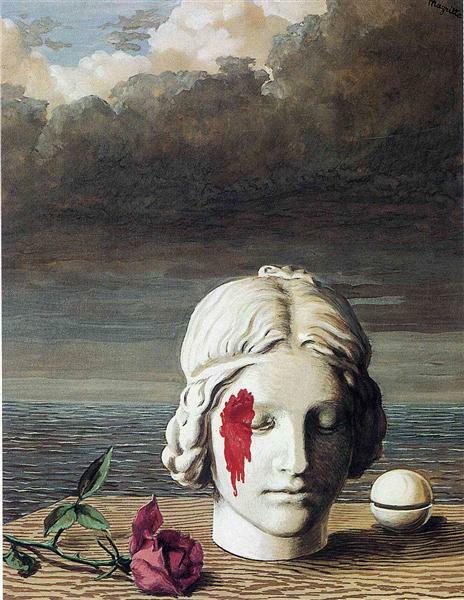 Memory - Rene Magritte (1948)
Memory - Rene Magritte (1948)

SOCRATES: Some one will say, Can a man who has ever known anything, and still has and preserves a memory of that which he knows, not know that which he remembers at the time when he remembers? I have, I fear, a tedious way of putting a simple question, which is only, whether a man who has learned, and remembers, can fail to know?
THEAETETUS: Impossible, Socrates; the supposition is monstrous.
SOCRATES: Am I talking nonsense, then? Think: is not seeing perceiving, and is not sight perception?
THEAETETUS: True.
SOCRATES: And if our recent definition holds, every man knows that which he has seen?
THEAETETUS: Yes.
SOCRATES: And you would admit that there is such a thing as memory?
THEAETETUS: Yes.
SOCRATES: And is memory of something or of nothing?
THEAETETUS: Of something, surely.
SOCRATES: Of things learned and perceived, that is?
THEAETETUS: Certainly.
SOCRATES: Often a man remembers that which he has seen?
THEAETETUS: True.
SOCRATES: And if he closed his eyes, would he forget?
THEAETETUS: Who, Socrates, would dare to say so?
SOCRATES: But we must say so, if the previous argument is to be maintained.
THEAETETUS: What do you mean? I am not quite sure that I understand you, though I have a strong suspicion that you are right.
SOCRATES: As thus: he who sees knows, as we say, that which he sees; for perception and sight and knowledge are admitted to be the same.
THEAETETUS: Certainly.
SOCRATES: But he who saw, and has knowledge of that which he saw, remembers, when he closes his eyes, that which he no longer sees.
THEAETETUS: True.
SOCRATES: And seeing is knowing, and therefore not-seeing is not-knowing?
THEAETETUS: Very true.
SOCRATES: Then the inference is, that a man may have attained the knowledge of something, which he may remember and yet not know, because he does not see; and this has been affirmed by us to be a monstrous supposition.
THEAETETUS: Most true.
SOCRATES: Thus, then, the assertion that knowledge and perception are one, involves a manifest impossibility?
THEAETETUS: Yes.
SOCRATES: Then they must be distinguished?
THEAETETUS: I suppose that they must.
SOCRATES: Once more we shall have to begin, and ask 'What is knowledge?' and yet, Theaetetus, what are we going to do?
THEAETETUS: About what?
SOCRATES: Like a good-for-nothing cock, without having won the victory, we walk away from the argument and crow.
THEAETETUS: How do you mean?
SOCRATES: After the manner of disputers (Lys.; Phaedo; Republic), we were satisfied with mere verbal consistency, and were well pleased if in this way we could gain an advantage. Although professing not to be mere Eristics, but philosophers, I suspect that we have unconsciously fallen into the error of that ingenious class of persons.
THEAETETUS: I do not as yet understand you.
SOCRATES: Then I will try to explain myself: just now we asked the question, whether a man who had learned and remembered could fail to know, and we showed that a person who had seen might remember when he had his eyes shut and could not see, and then he would at the same time remember and not know. But this was an impossibility. And so the Protagorean fable came to nought, and yours also, who maintained that knowledge is the same as perception.
THEAETETUS: True.
SOCRATES: And yet, my friend, I rather suspect that the result would have been different if Protagoras, who was the father of the first of the two brats, had been alive; he would have had a great deal to say on their behalf. But he is dead, and we insult over his orphan child; and even the guardians whom he left, and of whom our friend Theodorus is one, are unwilling to give any help, and therefore I suppose that I must take up his cause myself, and see justice done?
THEODORUS: Not I, Socrates, but rather Callias, the son of Hipponicus, is guardian of his orphans. I was too soon diverted from the abstractions of dialectic to geometry. Nevertheless, I shall be grateful to you if you assist him.
SOCRATES: Very good, Theodorus; you shall see how I will come to the rescue. If a person does not attend to the meaning of terms as they are commonly used in argument, he may be involved even in greater paradoxes than these. Shall I explain this matter to you or to Theaetetus?
THEODORUS: To both of us, and let the younger answer; he will incur less disgrace if he is discomfited.
SOCRATES: Then now let me ask the awful question, which is this:—Can a man know and also not know that which he knows?
THEODORUS: How shall we answer, Theaetetus?
THEAETETUS: He cannot, I should say.
SOCRATES: He can, if you maintain that seeing is knowing. When you are imprisoned in a well, as the saying is, and the self-assured adversary closes one of your eyes with his hand, and asks whether you can see his cloak with the eye which he has closed, how will you answer the inevitable man?
THEAETETUS: I should answer, 'Not with that eye but with the other.'
SOCRATES: Then you see and do not see the same thing at the same time.
THEAETETUS: Yes, in a certain sense.
SOCRATES: None of that, he will reply; I do not ask or bid you answer in what sense you know, but only whether you know that which you do not know. You have been proved to see that which you do not see; and you have already admitted that seeing is knowing, and that not-seeing is not-knowing: I leave you to draw the inference.
THEAETETUS: Yes; the inference is the contradictory of my assertion.
SOCRATES: Yes, my marvel, and there might have been yet worse things in store for you, if an opponent had gone on to ask whether you can have a sharp and also a dull knowledge, and whether you can know near, but not at a distance, or know the same thing with more or less intensity, and so on without end. Such questions might have been put to you by a light-armed mercenary, who argued for pay. He would have lain in wait for you, and when you took up the position, that sense is knowledge, he would have made an assault upon hearing, smelling, and the other senses;—he would have shown you no mercy; and while you were lost in envy and admiration of his wisdom, he would have got you into his net, out of which you would not have escaped until you had come to an understanding about the sum to be paid for your release. Well, you ask, and how will Protagoras reinforce his position? Shall I answer for him?
THEAETETUS: By all means.
SOCRATES: He will repeat all those things which we have been urging on his behalf, and then he will close with us in disdain, and say:—The worthy Socrates asked a little boy, whether the same man could remember and not know the same thing, and the boy said No, because he was frightened, and could not see what was coming, and then Socrates made fun of poor me. The truth is, O slatternly Socrates, that when you ask questions about any assertion of mine, and the person asked is found tripping, if he has answered as I should have answered, then I am refuted, but if he answers something else, then he is refuted and not I. For do you really suppose that any one would admit the memory which a man has of an impression which has passed away to be the same with that which he experienced at the time? Assuredly not. Or would he hesitate to acknowledge that the same man may know and not know the same thing? Or, if he is afraid of making this admission, would he ever grant that one who has become unlike is the same as before he became unlike? Or would he admit that a man is one at all, and not rather many and infinite as the changes which take place in him? I speak by the card in order to avoid entanglements of words. But, O my good sir, he will say, come to the argument in a more generous spirit; and either show, if you can, that our sensations are not relative and individual, or, if you admit them to be so, prove that this does not involve the consequence that the appearance becomes, or, if you will have the word, is, to the individual only. As to your talk about pigs and baboons, you are yourself behaving like a pig, and you teach your hearers to make sport of my writings in the same ignorant manner; but this is not to your credit. For I declare that the truth is as I have written, and that each of us is a measure of existence and of non-existence. Yet one man may be a thousand times better than another in proportion as different things are and appear to him. And I am far from saying that wisdom and the wise man have no existence; but I say that the wise man is he who makes the evils which appear and are to a man, into goods which are and appear to him. And I would beg you not to press my words in the letter, but to take the meaning of them as I will explain them. Remember what has been already said,—that to the sick man his food appears to be and is bitter, and to the man in health the opposite of bitter. Now I cannot conceive that one of these men can be or ought to be made wiser than the other: nor can you assert that the sick man because he has one impression is foolish, and the healthy man because he has another is wise; but the one state requires to be changed into the other, the worse into the better. As in education, a change of state has to be effected, and the sophist accomplishes by words the change which the physician works by the aid of drugs. Not that any one ever made another think truly, who previously thought falsely. For no one can think what is not, or, think anything different from that which he feels; and this is always true. But as the inferior habit of mind has thoughts of kindred nature, so I conceive that a good mind causes men to have good thoughts; and these which the inexperienced call true, I maintain to be only better, and not truer than others. And, O my dear Socrates, I do not call wise men tadpoles: far from it; I say that they are the physicians of the human body, and the husbandmen of plants—for the husbandmen also take away the evil and disordered sensations of plants, and infuse into them good and healthy sensations—aye and true ones; and the wise and good rhetoricians make the good instead of the evil to seem just to states; for whatever appears to a state to be just and fair, so long as it is regarded as such, is just and fair to it; but the teacher of wisdom causes the good to take the place of the evil, both in appearance and in reality. And in like manner the Sophist who is able to train his pupils in this spirit is a wise man, and deserves to be well paid by them. And so one man is wiser than another; and no one thinks falsely, and you, whether you will or not, must endure to be a measure. On these foundations the argument stands firm, which you, Socrates, may, if you please, overthrow by an opposite argument, or if you like you may put questions to me—a method to which no intelligent person will object, quite the reverse. But I must beg you to put fair questions: for there is great inconsistency in saying that you have a zeal for virtue, and then always behaving unfairly in argument. The unfairness of which I complain is that you do not distinguish between mere disputation and dialectic: the disputer may trip up his opponent as often as he likes, and make fun; but the dialectician will be in earnest, and only correct his adversary when necessary, telling him the errors into which he has fallen through his own fault, or that of the company which he has previously kept. If you do so, your adversary will lay the blame of his own confusion and perplexity on himself, and not on you. He will follow and love you, and will hate himself, and escape from himself into philosophy, in order that he may become different from what he was. But the other mode of arguing, which is practised by the many, will have just the opposite effect upon him; and as he grows older, instead of turning philosopher, he will come to hate philosophy. I would recommend you, therefore, as I said before, not to encourage yourself in this polemical and controversial temper, but to find out, in a friendly and congenial spirit, what we really mean when we say that all things are in motion, and that to every individual and state what appears, is. In this manner you will consider whether knowledge and sensation are the same or different, but you will not argue, as you were just now doing, from the customary use of names and words, which the vulgar pervert in all sorts of ways, causing infinite perplexity to one another. Such, Theodorus, is the very slight help which I am able to offer to your old friend; had he been living, he would have helped himself in a far more gloriose style.
THEODORUS: You are jesting, Socrates; indeed, your defence of him has been most valorous.
SOCRATES: Thank you, friend; and I hope that you observed Protagoras bidding us be serious, as the text, 'Man is the measure of all things,' was a solemn one; and he reproached us with making a boy the medium of discourse, and said that the boy's timidity was made to tell against his argument; he also declared that we made a joke of him.
THEODORUS: How could I fail to observe all that, Socrates?
SOCRATES: Well, and shall we do as he says?
THEODORUS: By all means.
SOCRATES: But if his wishes are to be regarded, you and I must take up the argument, and in all seriousness, and ask and answer one another, for you see that the rest of us are nothing but boys. In no other way can we escape the imputation, that in our fresh analysis of his thesis we are making fun with boys.
THEODORUS: Well, but is not Theaetetus better able to follow a philosophical enquiry than a great many men who have long beards?
SOCRATES: Yes, Theodorus, but not better than you; and therefore please not to imagine that I am to defend by every means in my power your departed friend; and that you are to defend nothing and nobody. At any rate, my good man, do not sheer off until we know whether you are a true measure of diagrams, or whether all men are equally measures and sufficient for themselves in astronomy and geometry, and the other branches of knowledge in which you are supposed to excel them.
THEODORUS: He who is sitting by you, Socrates, will not easily avoid being drawn into an argument; and when I said just now that you would excuse me, and not, like the Lacedaemonians, compel me to strip and fight, I was talking nonsense—I should rather compare you to Scirrhon, who threw travellers from the rocks; for the Lacedaemonian rule is 'strip or depart,' but you seem to go about your work more after the fashion of Antaeus: you will not allow any one who approaches you to depart until you have stripped him, and he has been compelled to try a fall with you in argument.
SOCRATES: There, Theodorus, you have hit off precisely the nature of my complaint; but I am even more pugnacious than the giants of old, for I have met with no end of heroes; many a Heracles, many a Theseus, mighty in words, has broken my head; nevertheless I am always at this rough exercise, which inspires me like a passion. Please, then, to try a fall with me, whereby you will do yourself good as well as me.
THEODORUS: I consent; lead me whither you will, for I know that you are like destiny; no man can escape from any argument which you may weave for him. But I am not disposed to go further than you suggest.
SOCRATES: Once will be enough; and now take particular care that we do not again unwittingly expose ourselves to the reproach of talking childishly.
THEODORUS: I will do my best to avoid that error.


Be kind, for everyone you meet is fighting a harder battle.
~ Plato

Thank you for your support of The Literary Review and for being a patron of great literature and the arts.
Best wishes!

